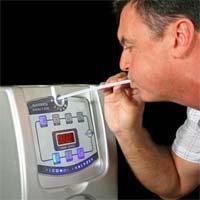Breath Screening May Help Detect Early Mesothelioma
 Belgian scientists say a new kind of breath analysis tool holds promise as a way to screen former asbestos workers for early signs of malignant mesothelioma.
Belgian scientists say a new kind of breath analysis tool holds promise as a way to screen former asbestos workers for early signs of malignant mesothelioma.
Doctors in the Departments of Respiratory and Internal Medicine at Ghent University made that determination after administering breath analysis tests to 66 people, including 23 malignant pleural mesothelioma patients.
A New Type of Breath Test
To conduct their breath analysis study, the Belgian team used a relatively new technology called multi-capillary column-ion mobility spectrometry (MCC-IMS).
The system measures the kinds and levels of volatile organic compounds (VOCs) in the exhaled breath of test subjects. VOCs are organic compounds that that are gaseous at room temperature such as nitrogen, hydrogen, oxygen, chlorine and sulfur.
People with mesothelioma and those who have been exposed to asbestos tend to exhale different levels of VOCs than healthy people do.
Detecting Signs of Mesothelioma
The breath analysis was administered to 23 people with malignant pleural mesothelioma, a virulent cancer of the lung lining that is typically the result of asbestos exposure. Also tested were 22 people who had worked in an asbestos industry but had no symptoms of mesothelioma. Finally, the study included 21 healthy non-asbestos exposed people.
According to a summary of the study published in the Journal of Breath Research, the test was 76% accurate at distinguishing the mesothelioma patients from either the asbestos-exposed people or the healthy controls.
When it came to distinguishing between the asbestos-exposed people and those with mesothelioma, the test had an 87% accuracy.
Screening for Mesothelioma
As with most cancers, people with a diagnosis of mesothelioma have the best chance of survival when the disease is detected early. This is especially difficult with mesothelioma since it typically does not cause symptoms until it is in an advanced stage.
Right now, there is no reliable way to screen for mesothelioma. But the Belgian researchers say they are hopeful that MCC-IMS analysis may improve the odds for people at the highest risk of this rare and deadly cancer.
The paper concludes, “Breath analysis by MCC/IMS allows malignant pleural mesothelioma patients to be discriminated from controls and holds promise for further investigation as a screening tool for former asbestos-exposed persons at risk of developing malignant pleural mesothelioma.”
Source:
Lamote, Kevin, et al, “Detection of malignant pleural mesothelioma in exhaled breath by multicapillary column/ion mobility spectrometry (MCC/IMS)”, September 26, 2016, Journal of Breath Research, Volume 10, No. 4.





